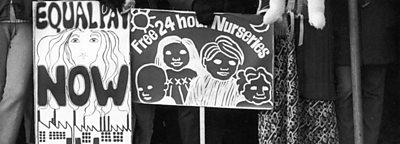In the early years, the 大象传媒 prided itself on its equal treatment of male and female staff. Yet by 1973 an explosive report was to uncover large scale misogyny and discrimination against women. A second report in 1985 showed little change. Newly released oral history interviews give a fresh perspective on equal opportunities at the 大象传媒.
The 1920s and 1930s were an era of endemic sexual discrimination in Britain. For women such as teachers and civil servants this meant not only unequal treatment in terms of promotion and pay, but also on the basis of marital status; married women were forced to resign.
In its first decade, the 大象传媒 bucked this trend. In April 1926, John Reith sent a memorandum to all 大象传媒 Station Directors headed 'Women Assistants' where he outlined his view that they "should rank on the same footing" as male assistants and that they "should be as eligible as men for promotion".
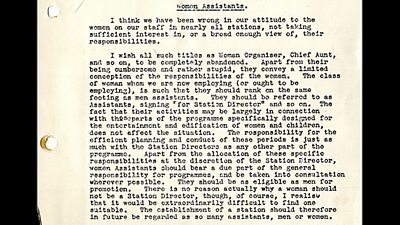
In 1928, this policy of equality was reiterated, "The principle of women working with equal status is accepted. The principle of married women so working is equally accepted." Mary Somerville was one of these.
In 1929, newly married and now the de facto Head of School Broadcasting, she announced that she was expecting a baby. As a result of this, maternity leave and maternity pay were introduced, which was almost unheard of at this time.
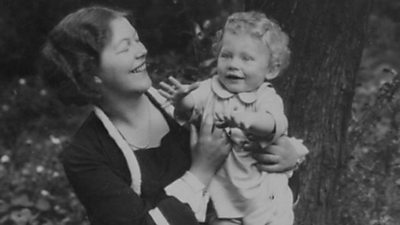
Unlike in teaching and the Civil Service, the 大象传媒's salary scales did not differentiate between men and women, rather staff were paid according to a grade. And some women, like Somerville, negotiated a higher rate.
In practice though, things at the 大象传媒 were not quite so rosy. Women tended to be appointed to lower grades and had less opportunity for advancement. And in 1932, largely due to the economic crisis that Britain was experiencing, a marriage bar was introduced although 'exceptional women' were exempt (the 大象传媒 did not want to lose its favoured female staff).
The bar was finally lifted during the war, in 1944.
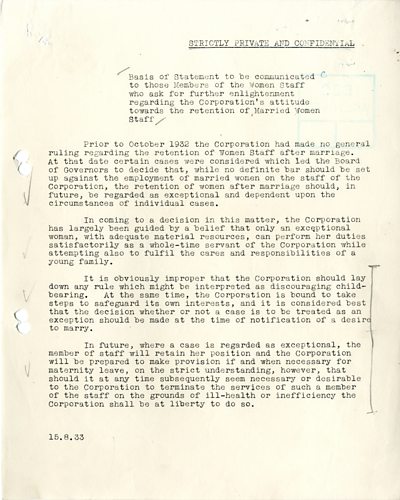
The women interviewed for the 大象传媒's Oral History Collection were, by definition, almost always 'exceptional', so it is important to understand their memories within this context. Nevertheless, the recollections of those who started at the 大象传媒 before the Second World War throw valuable new light on the status of women at this time.
Mary Lewis, who would go on to become the 大象传媒鈥檚 Head of Pay Policy, joined the 大象传媒 in 1938 as a Checking Clerk in the Duplicating Office. In her newly released interview, she recalls the very good conditions of service, which set the 大象传媒 apart from other organisations:
Janet Adam Smith was promoted to Assistant Editor of The Listener in 1931, a position for which she was held in high esteem.
She decided to leave the 大象传媒 when she married in 1935 and describes in her oral history interview how she received an unexpected pay rise from John Reith:
This experience of Janet Adam Smith highlights the complexity of pay and promotion issues at the 大象传媒.
Those with supportive managers, or with the clout to ask, could see their salaries rise, sometimes earning more than men. It was far more usual, though, for women to earn lower salaries. This was due in part to their market value and also because it was the acceptable norm.
As Martha Kearney has revealed in her profile of the 大象传媒 War Correspondent Audrey Russell, Russell only became aware of her pay discrepancy by chance.
There are many possible reasons why, post war, the 大象传媒 lost its edge and was no longer in the vanguard of equal opportunities employers.
From being a dynamic, young organisation in the new industry of broadcasting, it became increasingly professionalised, which favoured men. Also, by the late 1950s, many of the women who had risen to prominent positions in the 1930s and 1940s were retiring.
In a letter to The Times in 1959, Mary Agnes Hamilton, a former Governor of the 大象传媒, bemoaned the absence of senior women, pointing out how the Corporation now lagged behind the Civil Service in its treatment and promotion of female staff.
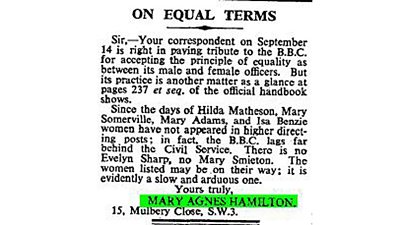
This lack of women in top posts was apparent to Frances Line. The future Controller of Radio 2 arrived as a secretary in 1957.
In her 大象传媒 Oral History Collection interview she touched upon the vacuum that was appearing in the late 1950s and the limited expectations that women then had:
"Well, women were seen and not heard really. There were some women who had come through in Radio during the war and they had got to positions of some authority, but really when they went, they were just considered to be something which had happened, a slight anomaly in the system. And when they went, they went away and were replaced normally by men. Women called their bosses 'Sir' which they normally were or 'Mr' whatever and they really didn't have any expectations of power or promotion."
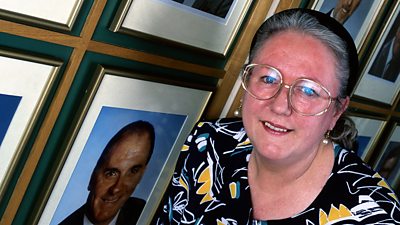
This lack of expectation that Line describes was firmly entrenched by the 1970s.
In 1971, as the women's liberation movement gathered steam, the book Women in Top Jobs berated the 大象传媒 for its severe lack of women in positions of seniority, prompting senior management to conduct an internal review.
The report, presented to the Board of Governors in 1973, was a damning indictment of women's roles at the 大象传媒. The level of antipathy expressed by some managers towards women is staggering, and there was little evidence of a collective memory of the gains women had previously made.
Interviews from the 大象传媒 Oral History Collection uncover the very different viewpoints held by two women who held senior positions in the mid-1970s.
Clare Lawson Dick, who retired from the 大象传媒 as Controller of Radio 4 in 1976, was convinced that the issue of equality was due to conditioning; a natural acceptance of men's superior place:
This view was not shared by Mary Lewis, who retired as Head of Pay Policy in the same year as Lawson Dick. In her oral history interview, she surmised that the problem of women's status could be solved if women were prepared to behave more like men:
Mary Lewis got it wrong. The first female camera operator, Barbara Franc, would stay for 15 years. There was some progress in the seventies, with recruits such as Franc, but despite adhering to the Sex Discrimination Act of 1975, change was slow.
Not until 1985, after the revelations of an internal review by Monica Sims, did the Corporation start seriously to address the status of its female employees.
On her retirement as Director of Programmes, Radio in 1984, Sims had been asked to conduct an enquiry into women managers at the 大象传媒.
In her 1989 大象传媒 Oral History interview, she talked frankly about the report, responding first to Frank Gillard's question, was the 大象传媒 a "man's club"?
Since the Sims Report, the 大象传媒 has rolled out a raft of equal opportunities policies. Targets were introduced from the 1990s along with schemes such as the Women's Development Initiative.
More recently, a Diversity Strategy (2011) and Diversity and Inclusion Strategy (2016) have been put in place. And in 2018 a report was published focusing on career progression and culture for gender equality at the 大象传媒, with a particular focus on women.
The issue of equal pay in broadcasting, however, remains the subject of lively debate.
Lorna Clarke has had to deal with this directly. As a production head in 大象传媒 Radio, she is responsible, among other things, for production work across Radio 2 and 6 Music.
In a newly recorded oral history interview, she speaks about the current debate. How important does she think it is for the 大象传媒's long-term future?
Further reading
-
大象传媒 Diversity and Inclusion The BBC's diversity and inclusion strategy 2016-2020
-
Making the 大象传媒 a great workplace for women A report on career progression and culture for gender equality at the 大象传媒, published in October 2018.
